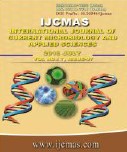


 National Academy of Agricultural Sciences (NAAS)
National Academy of Agricultural Sciences (NAAS)

|
PRINT ISSN : 2319-7692
Online ISSN : 2319-7706 Issues : 12 per year Publisher : Excellent Publishers Email : editorijcmas@gmail.com / submit@ijcmas.com Editor-in-chief: Dr.M.Prakash Index Copernicus ICV 2018: 95.39 NAAS RATING 2020: 5.38 |
Genetic variability and diversity play a major role in framing successful breeding programme. It is evident that genetically diverse parents are likely to produce high heterotic effects and yield desirable transgressive segregants. Keeping this in view, the present study was conducted to evaluate nature and extent of genetic variability and diversity in Indian mustard [Brassica juncea (L.) Czern. & Coss.]. About 31 genotypes including local, indigenous and exotic germplasm lines were evaluated in randomized complete block design with three replications across two environments during rabi 2008-09 and 2009-10. Significant variations across the years were observed. The results were also substantiated by the pooled analysis of variance that revealed highly significant differences for genotypes, environments and their interactions for most of the characters. Phenotypic coefficient of variation was higher than genotypic coefficient of variation for all the observed characters. High PCV and GCV were recorded for NAR and CGR. Genetic contribution of phenotypic expression of a trait is better reflected by the estimates of heritability. In this study, high heritability was recorded for biological yield per plant and seed yield per plant. Genetic advance expressed as per cent of mean was higher for NAR, CGR, biological yield per plant, harvest index and seed yield per plant. High heritability coupled with high genetic advance was observed for seed yield per plant and biological yield per plant indicating the role of effective selection to get genetic gain. Cluster analysis grouped the genotypes into six clusters and exhibited the presence of substantial genetic diversity among the genotypes. Cluster I was largest consisting of 26 genotypes while remaining clusters comprised of only one genotype each. The intra-cluster distance was comparable for cluster I (1.22) while for clusters II, III, IV, V and VI, intra-cluster distances were zero. The highest inter-cluster distance was observed between clusters III and V (3.41) followed by distance between clusters V and VI (3.36) and clusters II and V (3.14). The crosses involving parents belonging to most divergent clusters are expected to manifest maximum heterosis. Thus, crosses between the genotype of cluster III (Geeta) with that of cluster V (Heera) would produce high heterosis and are also likely to exhibit new recombination with desired traits in Indian mustard. The study revealed that cluster analysis for Indian mustard genotypes using growth parameters, morphological and yield contributing characters provides greater confidence for assessment of genetic diversity which could be used in subsequent breeding programme.
 |
 |
 |
 |
 |